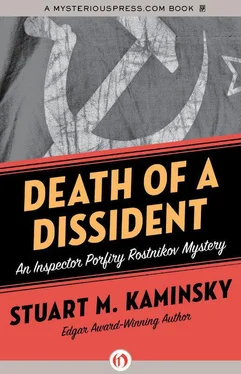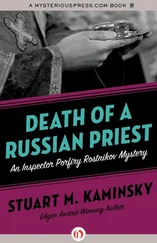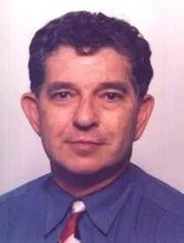Stuart Kaminsky - Death of a Dissident
Здесь есть возможность читать онлайн «Stuart Kaminsky - Death of a Dissident» весь текст электронной книги совершенно бесплатно (целиком полную версию без сокращений). В некоторых случаях можно слушать аудио, скачать через торрент в формате fb2 и присутствует краткое содержание. Год выпуска: 2012, ISBN: 2012, Жанр: Полицейский детектив, на английском языке. Описание произведения, (предисловие) а так же отзывы посетителей доступны на портале библиотеки ЛибКат.
- Название:Death of a Dissident
- Автор:
- Жанр:
- Год:2012
- ISBN:9781453266298
- Рейтинг книги:4 / 5. Голосов: 1
-
Избранное:Добавить в избранное
- Отзывы:
-
Ваша оценка:
- 80
- 1
- 2
- 3
- 4
- 5
Death of a Dissident: краткое содержание, описание и аннотация
Предлагаем к чтению аннотацию, описание, краткое содержание или предисловие (зависит от того, что написал сам автор книги «Death of a Dissident»). Если вы не нашли необходимую информацию о книге — напишите в комментариях, мы постараемся отыскать её.
Death of a Dissident — читать онлайн бесплатно полную книгу (весь текст) целиком
Ниже представлен текст книги, разбитый по страницам. Система сохранения места последней прочитанной страницы, позволяет с удобством читать онлайн бесплатно книгу «Death of a Dissident», без необходимости каждый раз заново искать на чём Вы остановились. Поставьте закладку, и сможете в любой момент перейти на страницу, на которой закончили чтение.
Интервал:
Закладка:
“Only perhaps?”
“It is quite likely,” said Lvov quietly. “Aleksander was an articulate and brave leader, but he was in many ways less than an honorable man.”
“It makes no sense,” said Rostnikov almost to himself. “If he caught them, why didn’t he kill them together, or her first? If she confessed, why did he kill Granovsky first? You see?”
“No,” said Lvov, who clearly did not see.
“Who told him about his wife and Granovsky, the man he worshipped like a father?”
“I don’t know,” said Lvov. “Would you like some tea?”
“No,” mused Rostnikov. “He said he had to make it even. That there were two of them. Perhaps he means to murder his father and stepmother.”
“Perhaps,” agreed Lvov, rising and moving slowly across the floor on thin white legs to prepare some tea.
“Two of them,” Rostnikov repeated and then the image came into his mind. It was a pair of thin shadows, and then the light touched them, and they had faces and the faces were those of Sonya and Natasha Granovsky.
He was back in the car in less than twenty seconds. The driver started the engine as soon as Rostnikov got in and shouted for him to hurry to Dimitry Ulanov Drive.
The driver turned as if to speak, saw Rostnikov’s pale face, and said nothing.
“Hurry, hurry,” urged the police inspector, and the driver hurried.
He was the best driver Rostnikov had ever seen. They took corners, even still icy ones, without a skid and without a slowdown. His hands remained steady and he anticipated lights and pedestrians as he sped through the streets. The trip took no more than ten minutes.
“Listen,” he told the driver as he got out. “We are looking for a man named Malenko, Ilyusha Malenko. He is twenty-eight and probably wearing a black coat. You don’t let anyone out of that door who even vaguely might be Malenko. You understand?”
“I understand,” the driver said, getting out and unbuttoning his holster.
“Good. I think he has killed three people and is quite dangerous. I would like him alive, but if that is not possible…You understand.”
Rostnikov hurried into the hall and to the elevator, but a sign was hung on it, indicating that it was out of order. Rostnikov began the climb up the stairs. He tried to hurry, but his leg denied him. At the third floor, he had to rest. Two young teen-age boys hurried past the exhausted man and fell into silence until they were a floor below him, where they said something about him being drunk. Rostnikov forced himself up. By the sixth floor he was in pain and dragging his foot. It struck him only then that he had no gun with him. He seldom used one. It was not that he was against the use of weapons, but the need came up so seldom that he left his gun locked in a drawer in his office.
There was no time to worry about it. He plunged down the hall, found the door, and knocked.
“Mrs. Granovsky. Sonya Granovsky,” he cried.
There was no answer. Rostnikov wasn’t sure of how strong the door was. In truth, at the moment, he wasn’t sure of how strong he was, but he planned to try. There was little room in the narrow corridor. He pushed himself against the wall opposite the door, placed his palms against the wall behind him, braced his bad foot and lifted his good one for a kick. He had taken two deep breaths and was about to kick, when he heard something behind the door. A movement. Something. He hesitated, stood up, and leaned forward to listen.
“Is someone in there?” he called. Silence. “Is someone in there?”
The door began to open, and the face of Sonya Granovsky appeared.
“Yes?” she said.
“It is me, Inspector Rostnikov. You remember me from the other night?”
“I remember you.” She looked thin and ill, as if she were about to collapse.
“May I come in?” he asked gently.
“No,” she said. “I’m afraid I…”
“I’ll have to insist,” he said as kindly as he could. She backed away and he entered carefully, ready.
“Where is your daughter?” he asked.
“Sleeping in the next room,” she said, folding her hands over her thin breasts and hugging herself as she sat in a wooden chair and failed to meet his eyes. There was something like the attitude of Simon Lvov about her.
“Late to be sleeping, isn’t it?” he asked, taking a step toward the closed door.
Sonya Granovsky stood up quickly and nervously, her right hand out to stop him.
“No,” she said, her voice breaking. “She’s been upset since…all this. Please let her sleep.”
Rostnikov turned from the door and supported himself on the edge of the sofa where he had first seen the two women. If something was in that room with which he had to deal, it would be best dealt with when his strength returned.
“Have you seen Ilyusha Malenko recently?” Rostnikov tried.
Sonya Granovsky collapsed back into the chair as if he had slapped her. Her head shook fiercely.
“No, no, no,” she said, without looking up.
“You have seen him,” Rostnikov repeated. “And you know what he has done.”
“No,” she cried. “No.”
“What is wrong here?” Rostnikov whispered moving away from the sofa toward the trembling woman. “Is he in there with your daughter?”
Her head shook violently to deny it, but Rostnikov could take no more. He looked around for a weapon, settled for one of the wooden chairs, picked it up easily, and limped to the closed door.
“No,” whimpered Sonya Granovsky, but Rostnikov did not hesitate. He threw his shoulder into the door, hoping that Malenko was right behind it listening and would be taken by surprise. The surprise was Rostnikov’s. He hurtled into the room and rolled onto the bed and against the wall. He righted himself as quickly as he could, prepared for an attack but nothing came. Sunlight came through the window, and he could see no one but himself in a wall mirror, looking foolish on the floor with a chair cradled in his arms. He pulled himself up as Sonya Granovsky entered the room.
“Where is your daughter, Sonya Granovsky?” he demanded.
“He took her,” she said.
CHAPTER ELEVEN
Viktor Shishko sat at his German-made typewriter in the office of the Moscow Pravda, turning the bit of information given him by Comrade Ivanov into a story. It was an important story dealing with the swift apprehension of the killer of Aleksander Granovsky. Viktor Shishko had been a reporter in Moscow for more than thirty years and had covered only two murder stories. He was well aware that dozens of murders took place every day in and around Moscow, but few of them were made known to anyone but the police and the people involved. Occasionally, though, there was a purpose to be served by publicity. Viktor Shishko found it easy to guess what the purpose was in this case, but he had no intention of sharing his conjecture with anyone else. When the story was finished, he would read it to Comrade Ivanov, who in turn would read it to someone who served the Party as liaison with the several investigatory agencies. Viktor had been through it all before and knew that the story would come back with small changes, cautious wording, though he himself was doing his best to be careful and anticipate the reason for the publication of the story.
Other writers, editors, and staff people, men and women, bustled past Viktor as he composed his short story:
Aleksander Granovsky, 42, former professor of history at Moscow University, was murdered last night by a cab driver with whom he had frequently quarreled. The cab driver, Mikel Vonovich, 39, wounded a police officer attempting to apprehend him. Trial will be held on the sixth of the month.
Shishko examined his brief story with satisfaction. He had omitted Granovsky’s reputation as a dissident and the fact that Granovsky was due to go on trial the morning after his death. He had also moved the date of Granovsky’s murder up one day to show how swiftly the police had caught the murderer. As an extra precaution, he had not included information about Vonovich’s black market activity. It was not his function to anticipate the political consequences of such things. Therefore, he did not include them. If the party liaison wanted those things in for good reason, then he or she could put them in.
Читать дальшеИнтервал:
Закладка:
Похожие книги на «Death of a Dissident»
Представляем Вашему вниманию похожие книги на «Death of a Dissident» списком для выбора. Мы отобрали схожую по названию и смыслу литературу в надежде предоставить читателям больше вариантов отыскать новые, интересные, ещё непрочитанные произведения.
Обсуждение, отзывы о книге «Death of a Dissident» и просто собственные мнения читателей. Оставьте ваши комментарии, напишите, что Вы думаете о произведении, его смысле или главных героях. Укажите что конкретно понравилось, а что нет, и почему Вы так считаете.












